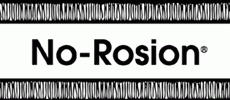

![]()
|
|
|
|
|
DIRECTIONS FOR USE: With engine off and cool, collect coolant sample from the radiator/petcock. DO NOT collect from a coolant recovery or overflow system. Coolant must be between 50 degrees F. to 130 degrees F. when tested. Remove a strip from one packet. DO NOT touch pads on the end of the strip. Discard unused strips if the pads at the end of turned dark brown. Dip strip in coolant sample for one second, remove, and shake strip briskly to remove excess fluid. Forty-five seconds later, compare and record results in the following order: (a) Compare hardness reading (end pad) to color chart and record result, (b) Next compare pH (middle pad) to color chart and record result, (c) lastly, compare the chloride to color chart and record result. All three readings must be completed no later than 75 seconds after dipping the strip. It is okay to estimate a value between color blocks; if uncertain about the color match, estimate towards the lighter color block. Once readings are complete, the chart will indicate whether water is safe to be used as engine coolant. |
|
 |
|
DID YOU KNOW... No-Rosion was in the cooling systems and fuel systems of ten award-winning classics at the 2025 Pebble Beach Concours d'Elegance! Copyright 2026 Applied Chemical Specialties, Inc. |